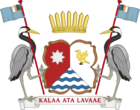Maaita of Freice
| Maaita of the Country of Freice | |
|---|---|
 | |
 Flag of Freice | |
Incumbent Kaana Tenkel (powers and duties suspended, as of December 22, 2023) Regent: Makeeia Taaguvigi since 30 January 2023 Joint hereditary officeholders
| |
| Style | No courtesy or style ascribed |
| Appointer | Representative Council |
| Term length | At the Council's pleasure |
| Inaugural holder | Tuaa Kaalalek |
| Formation | 1873 |
| Succession | Hereditary |
 |
|---|
| This article is part of a series on the politics and government of Freice |
|
Maaita (lit. 'He who Leads'; /mɑːiːtə/)[a] is the title of the head of state of the Country of Freice, an island country in the Kaldaz Sea. The title was first written into the 1917 constitution, enacted under the supervision of Riamo, although the position had been in existence since 1872. In the Common Language, the title is sometimes translated as "Leader" or "Ruler" and, more rarely, as "President" or "King".
The position was created by agreement of the three main chiefs of the island: Tuaa Savou, Mataasat Tailaavu, and Teeakaala Neeiet. Under the agreement, first codified in 1917, the office is hereditary and is held in gross by the chiefs and their lawful descendants. Formally, the office is held by all legal claimants (currently seven), but is exercised by a single claimant for a period of time agreed by all.
The current Maaita, since 30 January 2023, is Kaana Tenkel, who succeeded as the sole claimant to the Tuaa share. On 22 December 2023, Kaana voluntarily relinquished his powers to his wife, Makeeia Taaguvigi, who currently serves as regent ad interim.
Description
Role and responsibilities
The Maaita is designated Freice's head of state and maintains a role similar to that of a constitutional monarch. Under the constitution, the Maaita is responsible for the following:
- Preside over meetings of the Representative Council.
- Issuing an ordinance appointing the President of the Representative Council.
- Issuing the ordinance appointing committees
- Promulgating laws (countersigned by the president of the Council).
- Countersigning the ratification of treaties in the Council.
Although Maaitas had historically played a significant role in politics, modern Maaitas fulfill a more ceremonial position. Under the new constitution, the Maaita's executive powers are subject to approval in the Council, and the once unrestricted veto power is now limited to an ordinance which can be overruled by a majority of councillors.
Since 2009, the Maaita's role as presiding officer is undertaken by the President of the Representative Council, who is formally the deputy speaker.
Succession
The position is hereditary and possession is held by the inheritors of the three shares initially granted to the three chiefs. Each share constitutes a third of the whole office, with each inheritor possessing a proportion of their share. Under the constitution, holders of the office may designate one or more of their family to inherit their share, and may divide their share as they see fit. Where there are multiple holders of a share, they are required to nominate one of their number to be a "deputy of the share" and to hold the office in their name.
Under the constitution, the office is rotated amongst each share every ten years. If an incumbent dies during their term, their designated successor to their share takes on the post, rather than the position transferring to another share. If they are a nominated deputy, holders of that share nominate a new deputy to complete the term.
Officially, the Maaita is appointed by the Representative Council, but this is a formality which the council is constitutionally required to do. Women face no barrier to succession, beyond the personal prejudices of the Maaita, and there have been a number of female incumbents, who rule with the title of "Maavine" ('She who Leads')
Regency
Where a Maaita or Maavine is unable to discharge their duties, but remains in office, the Constitution provides for a regency. Whilst there is no specific individual designated to serve as regent, it is customary that it is the spouse rather than the heir. This is because the heir has not yet succeeded and, thus, has no right to discharge the office; the spouse, on the other hand, is responsible for guardianship of their incapacitated spouse.
Regency is declared in the Representative Council, and requires a majority vote of its members. A resolution is presented to the council and, if passed, it enacts provisions in the constitution. The resolution lasts for 60-days (or longer if designated) and then automatically ends unless the Council votes to extend it.
When a Maavine consort becomes regent, they retain the title of Maavine and assume the position of Designate of the Representative Council in Charge of Office (known informally as Regent). As the husband of a Maavine regnant is jure uxoris Maaita and legal co-ruler alongside his wife, there is no regent.
Status
Under the Constitution of Freice, sovereignty is explicitly vested in the people. The head of state is not defined as being of republican or monarchical nature, and various constitutional mechanisms and procedures frustrate an easy categorisation. The position is formally hereditary, but the incumbent is de jure appointed by the Representative Council and serves at its pleasure. The Maaita is also denied many of the customary privileges of monarchy, including a royal style and an enthronement or coronation.
A number of Kaldaist scholars and writers have characterised the position as more akin to an aristocratic system of government, with the various joint-holders of the office compared to feudal hereditary lords.
There is no style or additional title that incumbents may use. Heirs of a claimant may claim the courtesy title of "[Share] Mula" (e.g., Mevarau Kaana, Tuaa Mula).
Maaitas and Maavines of Freice
| # | Name (Birth–Death) |
Portrait | Reign start | Reign end | Share | Notes |
|---|---|---|---|---|---|---|
| 1 | Tuaa Savou (1841-1904) |
30 January 1873 | 30 January 1883 | Tuaa | First Maaita | |
| 2 | Mataasat Tailaavu (1842-1908) |
30 January 1883 | 30 January 1893 | Mataasat | ||
| 3 | Teeakaala Neeiet (1851-1916) |
30 January 1893 | 30 January 1903 | Teeakaala | ||
| 4 | Tuaa Savou (1841-1904) |
30 January 1903 | 4 March 1904 | Tuaa | Died in 1904 | |
| 5 | Kisarap Tuaa (1864-1929) |
4 March 1904 | 30 January 1913 | Served the remainder of the Tuaa term | ||
| 6 | Leiseini Mataasat (1872-1945) |
30 January 1913 | 30 January 1923 | Mataasat | ||
| 7 | Laaisani Teeakaala (1871-1938) |
30 January 1923 | 30 January 1933 | Teeakaala | ||
| 8 | Penimise Kisarap (1884-1951) |
30 January 1933 | 30 January 1943 | Tuaa | ||
| 9 | Leiseini Mataasat (1872-1945) |
30 January 1943 | 9 January 1945 | Mataasat | ||
| 10 | Jalimateki Leiseini (1895-1962) |
9 January 1945 | 30 January 1953 | |||
| 11 | Merenereta Laaisani (1890-1960) |
30 January 1953 | 18 August 1960 | Teeakaala | ||
| 10 | Ejeki Merenereta (1916-1985) |
18 August 1960 | 30 January 1963 | |||
| 11 | Rataavuna Penimise (1904-1975) |
30 January 1963 | 30 January 1973 | Tuaa | ||
| 11 | Saleevi Jalimateki (1914-1988) |
30 January 1973 | 30 January 1983 | Mataasat | ||
| 12 | Saamaime Ejeki (1937-2009) |
30 January 1983 | 30 January 1993 | Teeakaala | Succeeded his father on the latter's abdication of inheritance rights | |
| 13 | Tenkel Rataavuna (1929-1978) |
30 January 1993 | 30 January 2003 | Tuaa | ||
| 14 | Tevee Saleevi (1937-2019) |
30 January 2003 | 30 January 2013 | Mataasat | ||
| 15 | Nejoione Saamaime (b.1959) |
30 January 2013 | 30 January 2023 | Teeakaala | ||
| 16 | Kaana Tenkel (b.1967) |
30 January 2023 | Incumbent | Tuaa | ||
| - | Makeeia Taaguvigi (b.1969) |
22 December 2023 | Incumbent | Regent for Kaana Tenkel |
Timeline

See also
Notes
- ↑ When female Maavine (lit. 'She who leads'; /mɑːviːnə/)


